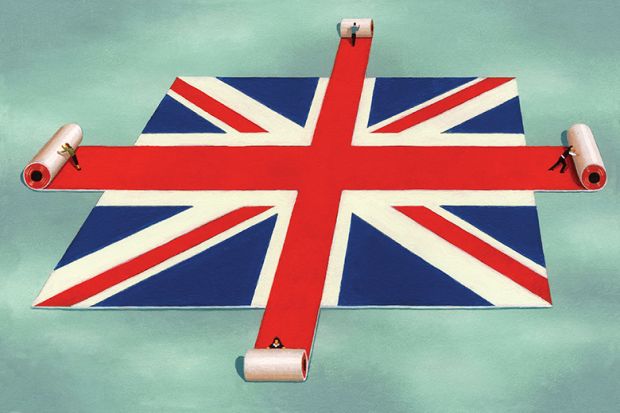If Brexit has few friends among European Union member states, it has even fewer among the non-members that also participate in the EU’s research and innovation framework programmes, whose ranks the UK hopes to join.
The impasse over the EU withdrawal agreement means that there has been little discussion of the proposed framework for the future relationship between the UK and the EU. This uncertainty is reflected in the European Council’s reluctance to discuss the terms via which such “third countries” will be able to access the next framework programme, known as Horizon Europe.
But we know already that Brexit will change the architecture of the EU’s relationship with third countries. Whereas previous association agreements provided full access, the EU now reserves the right to exclude third countries from certain types of Horizon Europe funding – including, if the European Parliament has its way, prestigious individual grants, such as those provided by the European Research Council and the European Innovation Council. The EU will not be compelled to take this approach, but associated countries may need to fight harder for access.
Existing associated countries have also been disturbed by the EU’s decision to change the financial mechanisms for balancing net gains and payments. In the past, contributions were determined up front, according to gross domestic product. This meant that some countries gained more than others; most spectacularly, Israel has received 50 per cent more from Horizon 2020 than it has paid in. But in the poisoned atmosphere of Brexit, net transfer of funds would not be acceptable to either side. So all third countries except for members of the European Economic Area will now be expected to pay in what they receive. Since this figure cannot be known in advance, it will complicate the setting of national science budgets.
If (and only if) there is a withdrawal agreement, it is likely that the UK could be associated with Horizon Europe from its beginning, in 2021. However, the arrangement would likely be temporary, pending negotiations about the long-term UK-EU relationship.
This is because association agreements never stand alone. They are embedded in a country’s overall relationship with the EU. Israel’s association is framed by the European Neighbourhood Policy, which requires that no funding should cross the “Green Line” delineating Israel’s pre-1967 border. Norway’s association is framed by its membership of the EEA and participation in the single market. And Switzerland’s is integral to a series of explicitly interconnected bilateral agreements.
The lesson from Switzerland’s partial exit from Horizon 2020 between 2014 and 2016 (after it voted against the free movement of people from Croatia) is that exceptions can be made to allow closely integrated research systems to continue while wider political problems are dealt with. But, ultimately, the nature of the UK-EU relationship in research and innovation will be part of a wider political framework. Although the withdrawal agreement and the Declaration on the Future Relationship make scant mention of research and innovation, these documents will nonetheless be of vital importance in framing any permanent association agreement.
It is already clear that there will be a dramatic collapse in UK participation in the current framework programme, Horizon 2020. How many projects coordinated by the UK are currently being submitted? Norway’s main research funder, for instance, recently warned that academics considering collaborations with UK researchers should be very wary.
Switzerland’s share of participants has declined from 3.2 per cent in the previous framework programme to 2.4 per cent in Horizon 2020, while its share of coordinators of collaborative projects has fallen from 3.9 per cent to 2.6 per cent. The message is clear: it will take years for the UK’s scientific relationships to be rebuilt.
So rather than inviting suspicion among other third countries by insisting on its own special importance in any association relationship, the UK would do well to develop stronger relationships and partnerships with the likes of Switzerland and Norway, from whose experiences it has much to learn. It is easy to understate the amount of informal influence that associated countries can have over the shape of framework programmes, but it will not make up for the UK’s post-Brexit loss of political power. For an MEP, no concern is as pressing as that of her constituents or the parties she represents. And in the European Council, the priorities of associated countries will never be as pressing as the need to come up with careful compromises among existing member states. As the priorities of Horizon Europe will reflect more closely those of the EU more generally, it is critical for associated countries to prepare for engaging, in both old and new ways.
The UK’s EU exit will signal the beginning, not the end, of a long process of determining how its science and innovation is integrated with that of the EU. Universities on both sides of the English Channel must prepare themselves for this. But they must also look beyond their own needs. They must participate in a wider discussion about how their concerns over scientific and educational exchange can help determine a future of mutuality, closeness and respect.
Jan Palmowski is secretary general of the Guild of European Research-Intensive Universities.
Register to continue
Why register?
- Registration is free and only takes a moment
- Once registered, you can read 3 articles a month
- Sign up for our newsletter
Subscribe
Or subscribe for unlimited access to:
- Unlimited access to news, views, insights & reviews
- Digital editions
- Digital access to THE’s university and college rankings analysis
Already registered or a current subscriber? Login






